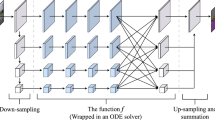Abstract
Semantic parsing of geometry word problems (GWPs) is the first step towards automated geometry problem solvers. Existing systems for this task heavily depend on language-specific NLP tools, and use hard-coded parsing rules. Moreover, these systems produce a static set of facts and record low precision scores. In this paper, we present the two-step memory network, a novel neural network architecture for deep semantic parsing of GWPs. Our model is language independent and optimized for low-resource domains. Without using any language-specific NLP tools, our system performs as good as existing systems. We also introduce on-demand fact extraction, where a solver can query the model about entities during the solving stage that alleviates the problem of imperfect recalls.
Access this chapter
Tax calculation will be finalised at checkout
Purchases are for personal use only
Similar content being viewed by others
Notes
- 1.
Our work can be accessed from this repository: https://github.com/IshJ/Two-step-memory-networks.
References
Miikkulainen, R.: Subsymbolic case-role analysis of sentences with embedded clauses. Cogn. Sci. 20(1), 47–73 (1996)
Sachan, M., Xing, E.: Learning to solve geometry problems from natural language demonstrations in textbooks. In: Proceedings of the 6th Joint Conference on Lexical and Computational Semantics (* SEM 2017), pp. 251–261 (2017)
Seo, M., et al.: Solving geometry problems: combining text and diagram interpretation. In: Proceedings of EMNLP 2015, pp. 1466–1476 (2015)
Socher, R., et al.: Recursive deep models for semantic compositionality over a sentiment treebank. In: Proceedings of EMNLP 2013, pp. 1631–1642 (2013)
Sukhbaatar, S., et al.: End-to-end memory networks. In: NIPS, pp. 2440–2448 (2015)
Weston, J., et al.: Memory networks. arXiv preprint arXiv:1410.3916 (2014)
Xu, K., et al.: Show, attend and tell: neural image caption generation with visual attention. In: International Conference on Machine Learning, pp. 2048–2057 (2015)
Acknowledgments
This research was funded by a Senate Research Committee (SRC) Grant of University of Moratuwa, Sri Lanka and LK Domain Registry, Sri Lanka.
Author information
Authors and Affiliations
Corresponding author
Editor information
Editors and Affiliations
Rights and permissions
Copyright information
© 2020 Springer Nature Switzerland AG
About this paper
Cite this paper
Jayasinghe, I., Ranathunga, S. (2020). Two-Step Memory Networks for Deep Semantic Parsing of Geometry Word Problems. In: Chatzigeorgiou, A., et al. SOFSEM 2020: Theory and Practice of Computer Science. SOFSEM 2020. Lecture Notes in Computer Science(), vol 12011. Springer, Cham. https://doi.org/10.1007/978-3-030-38919-2_57
Download citation
DOI: https://doi.org/10.1007/978-3-030-38919-2_57
Published:
Publisher Name: Springer, Cham
Print ISBN: 978-3-030-38918-5
Online ISBN: 978-3-030-38919-2
eBook Packages: Computer ScienceComputer Science (R0)




